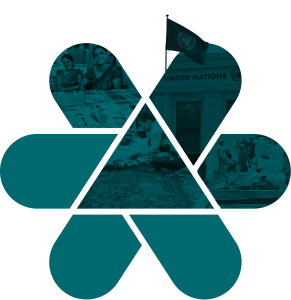Helvetas developed guidance for its country offices and local partners on how to advocate through the UN human rights system when national governments restrict civil society.
Download case study
Together with partners, Helvetas aims to tackle global challenges at multiple levels: with projects on the ground, with expert advice, and by advocating for conducive framework conditions benefiting the poor.
When civic space is closing at the national level, international mechanisms become more important, but are not always easy to access for national or sub-national organisations. Helvetas responded to this challenge by developing guidance for its country offices and local partners on how to advocate through the United Nations human rights system when national governments may be restricting civil society. The guidance sets out multiple entry points for advocacy beyond national boundaries through which national decision makers can be held to account, and which allow sensitive issues to be addressed in a safe space without exposure.
Securing buy-in
Securing organisational buy-in for this work can be challenging: there is some critique that it can feel like ‘just another paper’, and there have been questions about what the real outcome of these processes is if governments then don’t change their behaviour. It can be a long process, but advocates have underlined that it is still valuable in terms of providing safe space for groups to raise issues of concern, and that is an achievement regardless of government action or inaction following any reporting. International or multilateral-level work, and the creation of a safe space for discussion and exchange, is even more important when national-level space is severely restricted, helping to aid the resilience of civil society in the long-term.
Long-term funding
There are concerns about how to secure long-term funding, as donors can be wary of advocacy work in restricted environments.
Mitigating the risk of exposure
Local partners may be concerned about the risk involved in engaging in these consultations, as it can require a certain level of exposure. This can be mitigated by integrating information into joint stakeholder reports (e.g. CIVICUS in Country A).
Be selective and strategic
It is vital to filter and select those UN mechanisms which suit your work: the UN system is large, multi-layered and complex, and so it is important to focus time and resources only on those mechanisms which have a chance of supporting your work.
Facilitation is key
Facilitation capacity at country level is key. Helvetas have found that the process is most successful when there is someone in the country office who both knows the lay of the land and who has the capacity to convene, coordinate and facilitate civil society groups on the ground to contribute to any report or process.
Agency matters
It is important that this facilitator role does not set the agenda. They need to help structure things, but also ensure that there is space for issues to be raised by local partners, enabling national voices and agency.
-
There has been demand and appreciation from country offices for this cross-cutting advocacy support and the strategic use of UN human rights mechanisms to strengthen country-level and thematic work. Feedback indicates that it is helpful to have someone processing national issues into ‘UN language’, and supporting the consultations (these consultations must follow certain rules and procedures, and be structured in a certain way in order to comply with UN standards and terminology).
-
The consultations provide a safe space for constructive dialogue between civil society and government, and this itself opens up civic space and builds capacity and resilience at the local and national level, building the confidence of local partners to speak out.
-
Formal recommendations issued under the UPR (or other UN) Process are recorded and can be a powerful point of reference for advocacy at all levels.